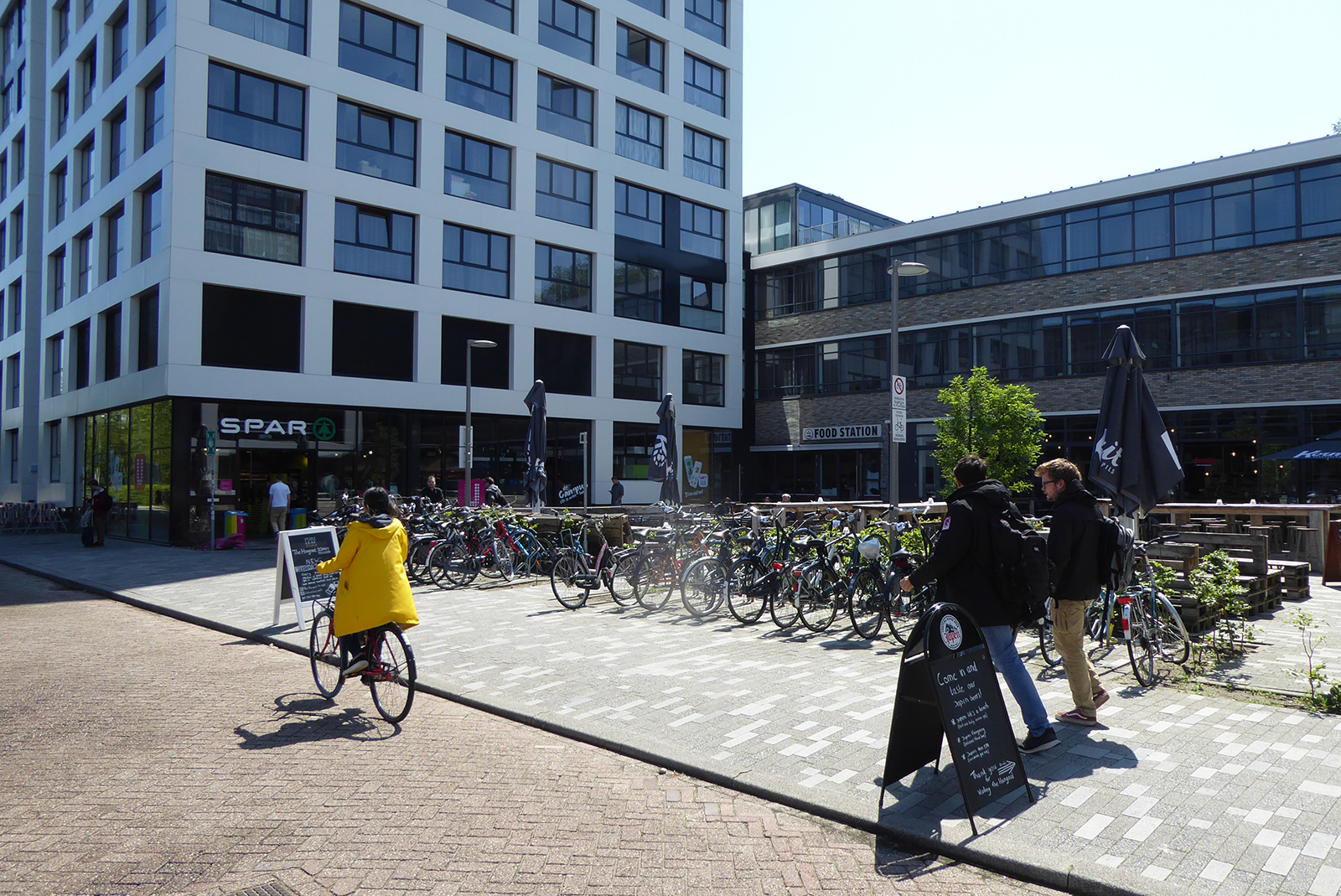The influx of new students is a good reason for student organisations to put pressure on the Municipality and TU Delft to deal with the shortage of accommodation.
According to the Municipality, 1,687 new student housing units were delivered in 2017 and 2018. Many of them are in this complex on the Stieltjesweg. (Photo: Jos Wassink)
In a press release, the student organisations say that the shortage of accommodation will rise to ‘unknown heights’. They say that there is a shortfall of 1,500 rooms and that that number will rise to 5,000 by 2026. The ‘Landelijke Monitor Studentenhuisvesting’ (national student housing monitor) 2018 report confirms that the Delft room rental market is ‘tight’. Delft is at the bottom of the Landelijke Studenten Vakbond’s (Dutch National Union of Students) list of best towns for student rooms. The ESN Delft, Oras, VSSD and WijWonen student organisations assert that the Municipality and TU Delft are not doing enough to build new accommodation or refurbish existing buildings.
The Municipality and TU Delft point to each other to find solutions, say the students. Dennis Botman, of the student housing organisation WijWonen, alleges that TU Delft is not making enough campus space available for student housing. Similarly, according to the student housing company, Duwo, the Municipality is also not making land available. These claims are being exacerbated by a tightening of the rules about room letting in the city centre – for students, already a thorn in their sides. A regulation passed by the Municipality in 2017 was intended to prevent homes from being turned into student houses. But an evaluation revealed loopholes. By registering as one group that co-habits, a residential house could still be turned into a house full of students renting by the room. The Municipality is now closing that loophole.
Upping the pressure
In contrast to the impression given by the student organisations’ allegations, in fact, they are in close consultation with the Municipality and TU Delft on the issue of student housing. In answer to the question whether the impression given in the press release that they have fallen foul of the Municipality and TU Delft is true, Botman confirms that this is indeed the case. That ‘feeling’ was definitely there. Now that many school students have passed their final exams, the big room hunt will start. This gives even more reason for TU Delft students to turn up the pressure on the Municipality and TU Delft.
Building locations are not easy to find
A spokesperson from TU Delft can only respond in general terms to the accusations of the students. “We recognise the students’ concerns about the need for more student housing. This is why we are in continual discussion with the Municipality and Duwo.”
The Municipality will not comment on the students’ press release – they do not want to be put on the spot. “We will discuss these and other points during our regular meetings with the various student organisations,” says a spokesperson. After some insistence to at least give some facts, she sends links to the ‘Tussentijdse Evaluatie Studentenhuisvesting’ (interim evaluation of student housing) and the ‘Woonagenda 2019-2022’ (housing policy).
The latter shows that new builds should be concentrated around the TU Delft campus and that exploration is underway in neighbouring municipalities. The document states that ‘The starting points in other parts of the city are small scale, mixed and dispersed’. It refers to at least 400 new units between now and 2022. Previously, a Municipality spokesperson reported to Delta that there would be at least 2,000 new units by 2023. The document also states that between 2017 and 2018, 1,687 new student units were delivered and that 279 would be delivered in 2019.
Delays caused by bats
The problem is that locations for building are not readily available. The students express their dissatisfaction about the low number of student housing in the new build area of Schieoevers. ‘Only 250 out of more than 1,000. It is a drop in the ocean.’ However, this area is largely in the hands of companies so the Municipality is unable to reserve space for student housing. Further, permit application processes can be slow. Take the plans for 136 new units on the Balthasar van der Polweg. In February 2012, Duwo said that the pre-fab new builds would be ready in 2013. Seven years later and the building work has not even started. According to Duwo’s branch manager, Michiel Ensink, this is partly due to the presence of protected bats in the area.
Still, students see opportunities galore. They point to the south end of the campus even though that area is zoned for commercial activities. They also point to the area around Delft Zuid station and the former Gele Scheikunde building that TU Delft is disposing of. Michiel Ensink also sees options. “It is positive that we are in dialogue with all of the various parties as a taskforce. I hope for change as the students’ situation is real. We see the shortage getting bigger while the number of affordable student housing lags behind. The waiting period for self-contained homes is going up to two-and-a-half to three years, while up till recently it was one to one-and-a-half years.”
Do you have a question or comment about this article?
s.m.bonger@tudelft.nl


Comments are closed.